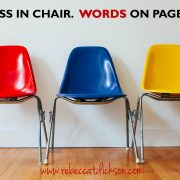5 Writing Lessons You Need to Unlearn (and 5 more you should adopt)
Oh sure. We all remember high school English. Verb-noun agreement. Proper use of the comma. How to write a thesis statement and a conclusion.
But some lessons are better off being forgotten. Here are five:
1 – Three sentences make a paragraph
Not always. In fact, hardly ever. If you’re writing a college essay, follow this rule. For your own writing, ignore that crap. It’s not uncommon to lead a news story with one sentence. In novels, it can be anything from one to five. The point is not to limit the number of sentences, but to complete the thought and keep the reader engaged.
Besides, everyone remembers rule-breakers.
It was the best of times, it was the worst of times, it was the age of wisdom, it was the age of foolishness, it was the epoch of belief, it was the epoch of incredulity, it was the season of Light, it was the season of Darkness, it was the spring of hope, it was the winter of despair. – Charles Dickens, A Tale of Two Cities.
If you really want to hear about it, the first thing you’ll probably want to know is where I was born, and what my lousy childhood was like, and how my parents were occupied, and all that David Copperfield kind of crap, but I don’t feel like going into it, if you want to know the truth. – J. D. Salinger, Catcher in the Rye.
It is a truth universally acknowledged that a single man in possession of a good fortune must be in want of a wife. – Jane Austen, Pride and Prejudice
2 – Two spaces between sentences
Just follow the link. It says it all, especially this: “Is this arbitrary? Sure it is. But so are a lot of our conventions for writing.”
3 – Every sentence needs a noun and verb
Sometimes, a sentence fragment is downright sexy. No really. It shakes shit up for the reader. Of course, it’s like anything else in that you don’t want to do it too much. Because then the effect is lost. Like when a writer italicizes something in every other sentence for emphasis. Or uses a million exclamation points. Get it?
4 – You need a beginning, a middle and an end
For a term paper. Not so much for other kinds of writing. We don’t always have time for preamble. Sometimes, we need to dive in.
You see this mainly in news reporting. But it’s also fucking polite (see what I did there?) to get to the point in an email, blog post or memo. People are busy. We don’t always have time to peruse pages and pages of bullshit. The best writers are great with word economy while giving us important details, so we want to keep reading.
Edna Buchanan began a story for The Miami Herald this way:
Bad things happen to the husbands of the Widow Elkin.
Someone murdered husband No. 4, Cecil Elkin, apparently smashing his head with a frying pan as he watched “Family Feud” on TV.
Husband No. 3, Samuel Smilich, drowned in a weedy South Dade canal.
Husband No. 2, Lawrence Myers, cannot be found. . .
Tell me you’re not dying to know the deal. She ends it this way:
It is the murder of her fourth husband that got Margaret Elkin in trouble. She is accused of trying to hire a beekeeper to kill him. The trial is set for Sept. 9.
A typical story would have started with the date for the trial – because that’s the news. But when Buchanan dug around for info, she found an amazing series of events. And she was smart enough to write it that way. (In journalist jargon, this is called a kicker.)
5 – Throw out your thesaurus
Or burn it. Your choice.
The thesaurus causes more problems than it solves. And as long as it’s around, you’ll be tempted to use it rather than rely on your own brilliance.
And trust me: your words are far better than anything you seek in the thesaurus.
I spend the majority of my editing time reminding writers to just say what they mean. Don’t be clever. Be clear. Don’t make the reader work because you have to work to write it. Because the reader won’t work to read. She will stop reading and that sucks for you, the writer.
Every time you pick up the thesaurus, you’re seeking a word to replace whatever came to mind. Ask yourself, “Would I grab a thesaurus to replace a word before I said it in conversation with a friend?” Of course not. So don’t write that way. Just say it.
• • •
Now that we’ve covered the shit you don’t need, let’s look at five quick things you can do to make your writing better.
1. Cut with a chainsaw
Sometimes writers get excited about description. That’s when it usually becomes wordiness. I call it overwriting and it’s common with both new and seasoned writers.
We want to create a new image. But the simplest way of saying something is also the best. When you thump your chest with your prose, you stop storytelling. Overwriting is trying too hard. Writing with clarity lets the story speak.
Does your reader need to know the killer prefers boxers to briefs? Unless it’s important to the plot, no.
Not sure if something should go? Take it out.
2. Hire an editor
I don’t care who you are, if you’re a writer, you need an editor. If you are an editor, you definitely need an editor.
3. Have a plot
Choose a complication and resolve it. This is a plot. Your character wants or needs something and can’t get it for some reason. This is the complication.
How do they get it? This is the story. Once your character figures out how to get what she wants, you have a plot.
4. Write a lot, then write some more
The more you do a thing, the better you become. Nowhere is this more true than writing. Give yourself permission to write the utter crap you must write in order to improve.
5. Use “said”
Writers often try to come up with words to replace “said” as a dialogue tag. Shrieked. Groaned. Huffed. Growled. Choked.
Amateur mistake. You’re better than that.
“Said” doesn’t distract the reader from what’s important – your dialogue. Because like it or not, what is being said is more important than how it is being said. Don’t disrupt the flow of your story by thumping your chest with a fancy word. Don’t take your reader out of the story to pause and reflect on how clever you are. Readers hate that. They want to escape. It’s why they read.
***
Want to learn more about writing like YOU? I’m polishing a new product that will teach you exactly that. Join our subscriber list (upper right-hand corner) to hear more about it and get a discount when it’s released. I’ll also let you know when the new cell phone app is available.






Great post both from the “very funny” box and the “very educational” box. And the best line: I don’t care who you are, if you’re a writer, you need an editor. If you are an editor, you definitely need an editor. Thanks Becky. Keep it coming. xo Rick
Thank you so much. Your advice will be very useful to people who do not want to write like me, so that they would build reading audience. I just write the way I think communicates my thoughts effectively. And writing is not always easy or fluent with me even though I am always writing. But I do not get read much or marketed at all- whether professional writings or my creative works(novels, drama and poetry, also Africa-sense compositions), even when I use narrative style to communicate critical disciplinary knowledge. I do not give up because I know that some day persons searching for serious dialogue between writer and reader might go beyond my tough personal style to pick up what I am saying that command “think again style” are, perhaps, important.
Hope I used the commas right/write(?)here. Thanks for your useful tips. Hope I have bored you. Will use editors more often when they are not too costly ’cause my works do not sell.
I think every person new to writing should read this. Would definitely save them a lot of time! I really go with “Use Said” and “Cut with a Chainsaw”.
Very good, except for the last. I am so tired of the tyranny of saiders that I now make it a rule not to read any fiction that does not use other words for speech.
But what I object to here is the nastiness of your attack on people who have an above-first-year-ESL vocabulary. Using speech words other than “said” is NOT AN AMATEUR MISTAKE. It is not a mistake at all.
Your last rule should have read, “Many people’s personal taste, including mine, is to prefer that writers use only ‘said’. Using a wide array of speech words is entirely valid and makes for a much richer work for those strange people who enjoy richer fiction, but as many editors share this personal preference, your chances of getting published are improved if you resist the urge to use evocative words to describe a conversation.”
“Using a wide array of speech words is entirely valid and makes for a much richer work for those strange people who enjoy richer fiction…”
Actually, it doesn’t. What makes a richer work is the writer’s ability to show me the character’s facial expression and body language, so I can “see” how the words are said in my mind’s eye. Using something other than said for a dialogue tag is telling. And it’s not good writing.
Amen.
*GASP* Throw out my thesaurus? Are you fucking crazy?! No seriously. That one scares the shit out of me. I have small children. Sometimes I needed to be reminded of grown up words that I know the meaning of. Sigh….. Thanks for another ass-whooping. I needed that.
Ugh, that two spaces after a sentence rule screwed me up for so long. My teachers were so specific on stuff that was hand written having two distinct spaces, but as soon as I started typing up essays, none of my teachers wanted the two spaces any more!